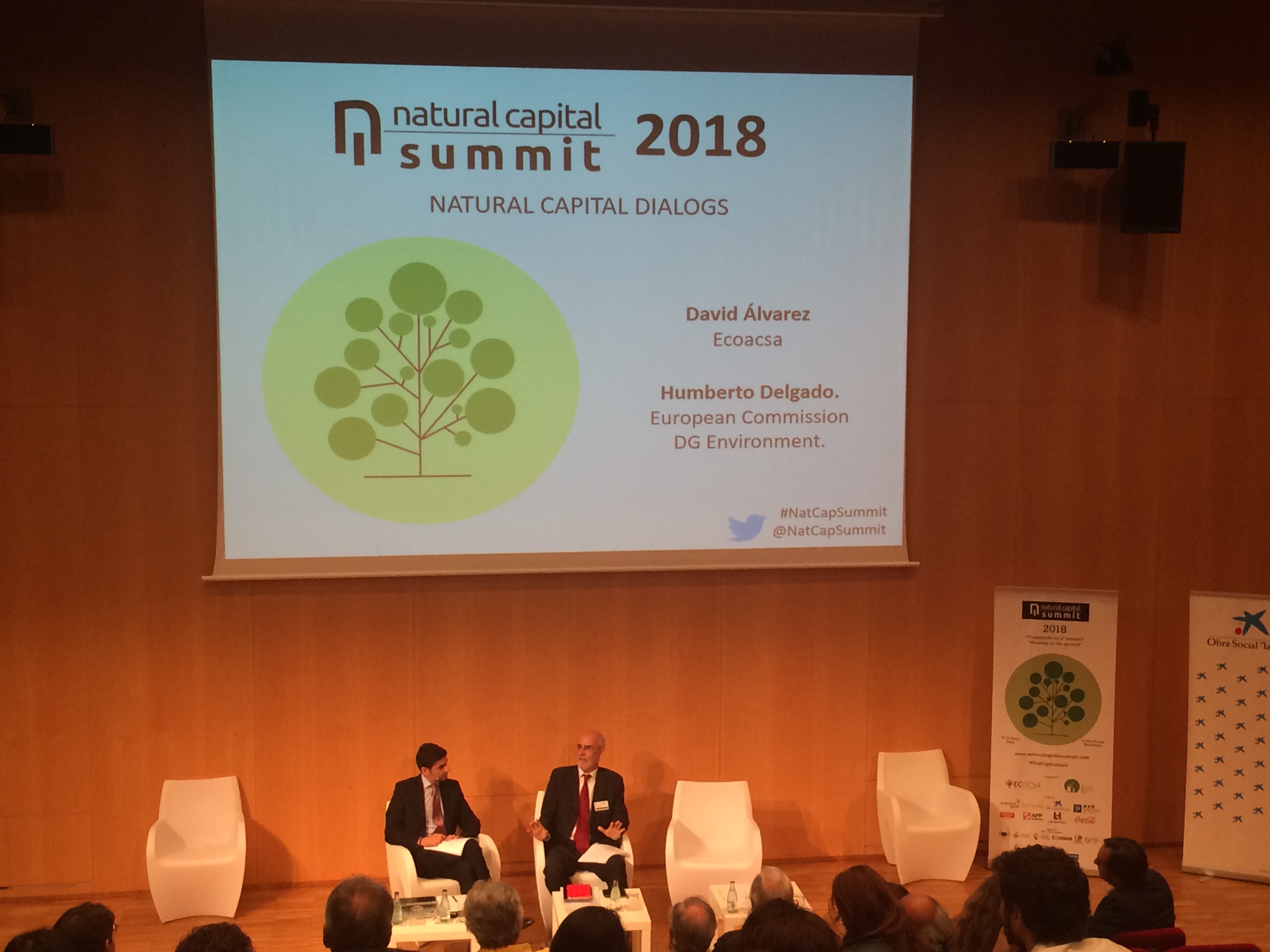The work of institutions, national governments and administrations is critical to consolidate the progress of the different trends. In the framework of the second edition of the Natural Capital Summit, we had the opportunity to talk with Humberto Delgado, Director for Natural Capital Director, DG Environment of the European Commission, who offered us a perspective on how we are working at community level to promote sustainability in its three dimensions: economic, social and environmental.
 Humberto Delgado highlighted in his talk with David Álvarez, Executive Director of Ecoacsa, that there are still many companies that do not make visible natural capital, however, «it is a concept that can only grow because society is moving towards sustainability.» «There are environmental risks that are not taken into account such as water filtration, soil fertility, the need to conserve genetic diversity to guarantee agricultural production … Not all risks are captured by the market, however, take them into account opens numerous opportunities,» he said.
Humberto Delgado highlighted in his talk with David Álvarez, Executive Director of Ecoacsa, that there are still many companies that do not make visible natural capital, however, «it is a concept that can only grow because society is moving towards sustainability.» «There are environmental risks that are not taken into account such as water filtration, soil fertility, the need to conserve genetic diversity to guarantee agricultural production … Not all risks are captured by the market, however, take them into account opens numerous opportunities,» he said.
The EU representative called attention to a reality that is still surprising today: «We take for granted that our natural capital is infinite, and it is not.» Therefore, companies that carry out environmental accounting and make explicit the environmental values of impacts derive from their activity and also the dependencies they have on natural resources have information to know what measures to adopt in order to reduce their effects and promote the conservation of natural goods and services, while ensuring that their supply chains are maintained over time and resilient.»
Among the lines that the European Commission is supporting to boost work on natural capital, Delgado referred to the Action Plan for Sustainable Finance, focused on four points:
1.- Creation of an unified EU classification system (‘taxonomy’) that defines what a «green» asset is.
2.- Investor´s duties and disclosures: The proposed regulation will introduce consistency and clarity on how institutional investors such us asset managers, insurance companies, pension funds or investment advisors should integrate environmental, social and governance factors (ESG) ) in their investment decision-making process. (Source: https://www.aktienkauf.at/aktien-im-atx/)
3.- Low carbon benchmarks: Two new benchmarks will be created to measure the impact on emissions. The low-carbon benchmark will classify companies according to their level of emissions (decarbonised) and the positive-carbon impact benchmark is more demanding and will classify companies according to their ability to meet more ambitious objectives such as the Paris Agreement.
4.- Better to advise to clients on sustainability: The Commission has launched a consultation to assess how best to include ESG considerations into the advice that investment firms and insurance distributors offer to individual clients.
Other drivers of organizations’ growing interest on natural capital approaches have been the Non-financial and diversity information Directive and the Natural Capital Financial Facility (NCFF). This financial mechanism put in place between the EC and the European Investment Bank is focused on supporting initiatives that promote natural capital conservation and climate change adaptation and mitigations.
With sights set on business sector, Delgado alluded to the fact that the Natural Capital Protocol developed by the Natural Capital Coalition greatly facilitates the measurement and assessment of the impacts and dependencies that development activities have on natural environment. In addition, he announced that work is currently being coordinated by the Coalition to better incorporate biodiversity into the Protocol, a task that is being supported by the Business @ Biodiversity initiative.
In relation to biological diversity issues, the spokesman for the Environment DG recalled that the EC launched at the beginning of the year a public consultation on how to tackle bees and other pollinators decline. The activity of these insects is essential for the pollination of crops and wild plants.
«Since the presentation by IPBES (Intergovernmental Platform on Biodiversity and Ecosystem Services) of its report on the situation of pollinators in the world, this issue has become a line of work of the EC. The economic impact and also the causes of pollinator species depletion are being evaluated. Among the latter are agriculture intensification and land use changes. “Current agricultural system is reaching its limit. Duties and opportunities are opened so that companies that take into account how pollination affects them change their model,» said Delgado.
In this regard, he stressed that «just in the same way as climate change problem has led to progress towards a less dependent on fossil fuels model, biodiversity decline and ecosystem services degradation should trigger a change in current agricultural systems. This aims to achieve a balance between meeting consumers´ and taking care of ecosystem services,» he stated.
The executive also advanced that by the end of the year, it is expected to present guidelines on investments in green infrastructure that improve ecosystem services. Additionally, he mentioned some of the co-financing opportunities available to promote natural capital conservation, such as LIFE Program, Horizon 2020 and the program focused on implementing Nature-Based Solutions.
With regard to LIFE Program, «it will increase its budget by 70% by 2020,» he said. This is indicative of why working in the field of environment is a priority, while other programs such as cohesion or agriculture will be endowed with less funds.
To conclude, Delgado stressed that, “if we all agree as a world in which the SDGs are fundamental and that natural capital is the basis of everything, this will be what causes the change we require.”


